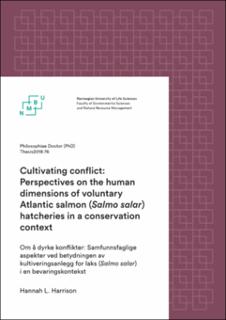Cultivating conflict : perspectives on the human dimensions of voluntary Atlantic salmon (Salmo salar) hatcheries in a conservation context
Doctoral thesis
Permanent lenke
https://hdl.handle.net/11250/2683441Utgivelsesdato
2018Metadata
Vis full innførselSamlinger
Sammendrag
The overall goal of this thesis is to offer a more in-depth human dimensions understanding of voluntary Atlantic salmon hatcheries, focusing on the underlying drivers of conflict over hatchery use in a conservation context. To achieve this, the thesis looks at hatcheries through different conservation social science lenses over the course of four papers. In doing so, this thesis represents a much-needed human dimensions approach to conflict revolving around the use of small-scale, voluntarily operated Atlantic salmon hatcheries in Wales, Norway, and Germany. The methods used for data collection and analysis are qualitative and include interviews, document analysis, and participant observation.
Voluntary hatcheries have been in use for over 150 years in Europe, and for much of the twentieth century they were viewed as popular management tools for improving local salmon stock levels for angling and conservation purposes. In the past 30 years, scientific knowledge has emerged showing that these hatcheries and their associated stocking practices may have deleterious effects on wild salmon populations due to behavioural, physiological, and genetic changes that occur to salmon when born and reared in the hatchery environment. This emerging knowledge has reshaped managerial attitudes toward Atlantic salmon stocking for conservation purposes at the international level, and state level stocking policies have changed to reflect those shifting views. In an instance of this, in 2014 both Wales and Norway made changes to their stocking policies that resulted in significant conflict between local-level cultivators and regional and state-level managers. Combining these case studies with a case in Germany (where stocking remains largely unregulated, but also unsupported at the state level), this thesis seeks to understand the underlying causes of conflict surrounding these cases, and shed light on the changing perspectives about cultivation as a conservation practice.
This thesis approaches this central problem from several perspectives. In the first paper, this research investigates how different knowledge forms meet, merge, and are reproduced in hatcheries as a form of hybridized knowledge. In the second paper, the thesis examines how technology affects and defines the human-salmon relationship via definitions and ontologies of nature and “naturalness” employed by managers and local-level cultivators. In the third paper, the thesis investigates what benefits hatcheries may provide aside from the production of fish. This paper identifies and describes what social, psychological, and conservation benefits hatcheries are producing to the surrounding salmon communities, and reveals how the production of these benefits plays into conflicts over the closure or restriction of hatchery activities. Finally, the fourth paper takes a close look at how conflicting discourses over the role of hatcheries form, change, and move between different planes of communication, and how conflict occurs in stages.
Taken together, the findings of this thesis point to several key reasons why stocking remains popular and contentious between pro- and anti-stocking advocates. First, this thesis demonstrates that hatcheries and stocking have different socio-cultural values to different stakeholder groups, and these disparate values are not sufficiently included in contemporary debates over stocking, particularly within academic and scientific spheres of discussion. For example, hatcheries provide opportunities for local-level stakeholders to integrate and hybridize broad scientific knowledge into their local contexts in order to improve their hatchery and fishery outcomes. It also shows that, like salmon themselves, hatcheries provide a broad range of benefits beyond the production of juvenile salmon. Thus, hatcheries are being valued beyond their mere capacity to produce fish, and are a preferred means of performing conservation in contexts that are not necessarily limited to the genetic, ecological, and biological concerns surrounding salmon cultivation.
This thesis also finds that underlying philosophies toward salmon conservation held by local-level stakeholders and state-level managers differ in their ontologies toward nature and knowledge. While managers and fisheries scientists commonly remain grounded in ecological and biological management priorities such as maintaining genetic biodiversity and naturalness within salmon populations, local-level stakeholders may view conservation priorities somewhat differently.
Similarly, local stakeholders are shown to draw from multiple ways of knowing in order to support their conservation efforts, and they are keen observers of the local environment and salmon population. This research shows that local-level cultivators are keenly aware and interested in improving their scientific knowledge as a means to improve their cultivation practices, and thus are adapting their knowledge sets to incorporate this information. Hatcheries are thus acting as facilitators for this process of knowledge hybridization, a function not yet incorporated into the hatchery debate.
This thesis shows that the common scientific understanding of the effects of salmon stocking, while important in biological and ecologically-oriented discussions, falls short of addressing all social, cultural, and conservation-oriented issues that are valuable to local-level stakeholders. Inspired by the “conflict transformation” approach, this thesis situates the implications of these findings in an emerging framework that suggests a transformation of the role of voluntary hatcheries from problematic producers of juvenile fish toward a conservation technology embedded in local contexts and capable of producing and facilitating a range of benefits, knowledges, and desirable conservation and social outcomes. More succinctly put, this emerging framework suggests that while voluntary hatcheries are biologically and ecologically problematic, they also simultaneously produce and perform many positive and beneficial socio-cultural aspects that have primary and secondary benefits to the cultivator communities engaged with them and to conservation of the surrounding salmon riverscapes. Instead of acting as the problematic centrum of conservation conflicts, this framework re-positions hatcheries as indicators of dynamic processes that acknowledge, support, and utilize the underlying social aspects of the conflicts identified in this thesis. As such, the thesis highlights strengths over which managers, scientists, and cultivation stakeholders may engage more productively, through focusing work around shared knowledge, a wider understanding of benefits, engagement in conservation and participatory research, and adaptive management.

